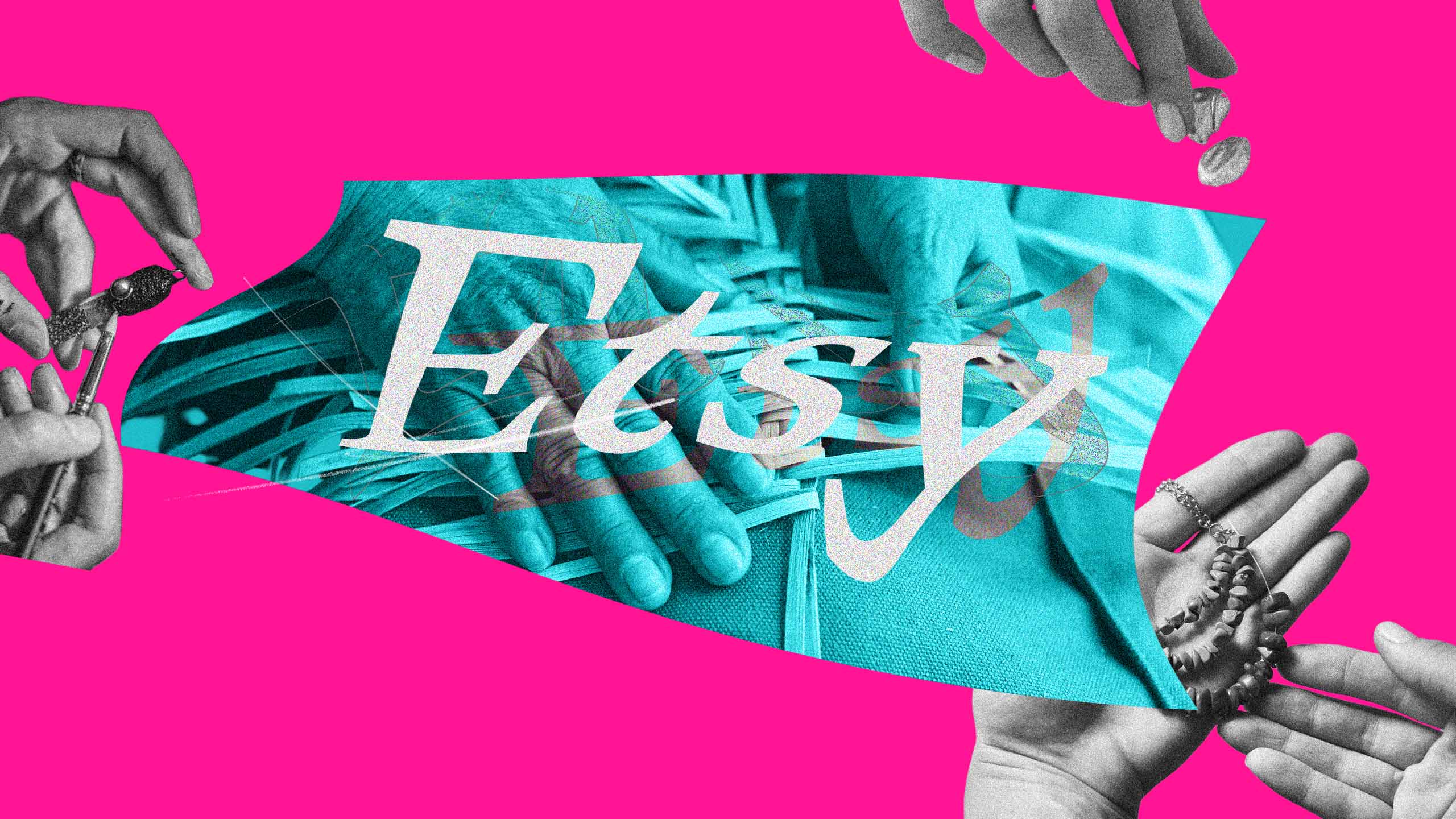Etsy released a statement last week announcing a huge update to their policy on mature content: as of July 29, sellers will no longer be able to platform a huge range of products related to sex and sexuality, including both penetrative and external sex toys like dildos and vibrators, all printed pornographic material (goodbye, campy vintage Playboy magazines) and “items bearing sexual language or slogans that contain references to familial relationships.” Etsy provided “Daddy’s slut” and “Choke me Mommy” as examples, in case this was confusing.
Sorry small-business-supporting leather daddies, but Etsy’s gone puritanical.
Many Etsy sellers are rightfully disappointed in the update, as Etsy has always prided itself on its open-mindedness, going so far as to claim: “As a creative community, we tend to be fairly liberal about what we allow on Etsy” (ironically, this is stated within their prohibited items policy).
Since its inception in 2005, Etsy has been a hub for small business creatives and hobbyists alike to sell their products, creating a welcome online alternative to traditional craft fairs or setting up an independent storefront. For queer customers, Etsy provides a space to browse through a huge number of products made with them in mind, and for queer businesses, the platform provides traffic and the option of anonymity. As a result, Etsy has been a long-standing platform for queer business, with the platform hosting hundreds of thousands of options for packers, strap-ons, queer ephemera, etc.
In their statement, VP Trust & Safety at Etsy Alice Wu claimed the new policy updates are a part of their ongoing effort to “keep Etsy and our community safe,” but many sellers on the platform feel like they’ve been pushed out of the community entirely.
As reported in the New York Times, one former Etsy seller, Avi Goldstein, went so far as to create his own platform this year after numerous issues with the way Etsy moderated mature items; Spicerack, a platform dedicated to adult products made by small businesses and artisans. Since the ban was announced, the platform has nearly doubled its number of vendors, leaning into the rush by providing a service that imports seller reviews and product listings directly from Etsy.
I can’t help but wonder who exactly in Etsy’s community these new regulations are supposed to “keep safe,” especially since Etsy’s previous policy already required sexual materials to be tagged as mature, kept out of the public areas of the seller’s account and required the thumbnail and initial images to be censored for general audiences.
This policy comes in the wake of multiple American states enforcing age verification laws on mature content online, and many more threatening to follow suit. This trend likely influenced Etsy’s unwillingness to continue supporting businesses that cater to sexuality and sexual expression more than a hazy, self-proclaimed commitment to “community safety.”
It’s a shame that instead of standing by its community of artisans, Etsy has chosen to cater to the wave of anti-sex policy sweeping tech platforms. It’s difficult to ignore the double standards these rules employ: for example, the decision to allow “non-insertable and non-penetrable adult toys and sexual accessories,” but not adult toys like vibrators, dildos and insertables, feels like a ridiculous—and confusing—line to draw.
The implications this has specifically for LGBTQ2S+ businesses and customers are worth noting. Studies have shown that a higher percentage of sex toy users identify as a member of the LGBTQ2S+ community, both in partnered play and alone. The ban also hits items that cater to the queer community specifically, like strap-on dildos and stroker toys designed for FtM anatomy. This is particularly egregious after Etsy’s rainbow-filled June Pride campaign—where they invited their audience to join them “in celebrating LGBTQIA+ creatives” (by buying from their Etsy shops, of course). Corporations know that queerness sells best when sanitized, and have no problem scrubbing the sex out of homosexuality to meet their bottom line.
The move reminds me of Tumblr’s now infamous mature content regulations. Back in 2018, the platform decided to scrub all sexual content from its site, ostensibly for “safety”—but more likely because they were removed from Apple’s notoriously strict app store. This hit queer artists the hardest, with many complaining that the policy was enacted with noticeable bias toward LGBTQ2S+ sexuality, something I would not be surprised to see happen with Etsy, given that neither platform acknowledged that queer sexuality is consistently policed harder—and deemed “obscene” more often—than its hetero counterpart.
Within four months of the policy implementation, Tumblr’s user count had tanked by 30 percent, with millions of users frustrated with what the new rules and regulations had done to a site formerly known for championing artistic expression, and/or feeling alienated by the way their own communities were pushed out. Five months later, Yahoo! sold the platform for just $3 million; 2.5 percent of the $1.1 billion they bought it for in 2013.
Etsy, like Tumblr, has a huge queer user base. Etsy, like Tumblr, has made hundreds of thousands, if not millions, off our community (the search “queer owned shop” garners thousands of results). It’s a routine we know all too well: platforms love to profit off sexuality—often queer sexuality, in particular—and then abandon it once they’re put in any position to actually support the right to sexuality and expression. It didn’t work out for Tumblr, and it would do well for Etsy to recognize what its user base has done for the platform, and start protecting its sellers instead of this nebulous (and frankly unconvincing) “community” that is supposedly made unsafe by appropriately tagged and moderated dildos.
Artists deserve stability, transparency and respect from platforms that profit off them. Queer communities deserve platforms that won’t cast us off once they realize that queerness isn’t just rainbow pins and marketable slogans. Sexuality is political, and we need the platform’s support just like they need ours (whether they realize it or not).


 Why you can trust Xtra
Why you can trust Xtra


